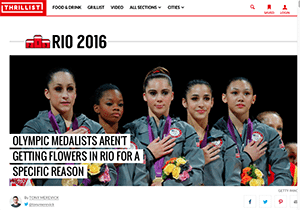
Instead of receiving bouquets along with their medals, winners at this year’s Summer Games are getting small sculptures of the Rio 2016 logo. Organizers said the traditional bouquets were “not very sustainable.” The omission has disappointed floral industry members and viewers around the world.
Fans tuning into the 2016 Summer Olympic Games in Rio over the past two weeks have noticed something important missing during the medal ceremonies: Flowers.
Instead of receiving bouquets along with their medals, winners at this year’s Summer Games are getting small, paperweight-like sculptures in the likeness of the Rio 2016 logo.
The change upends a long-standing tradition of presenting flowers to winners, but Christy Nicolay, the executive producer of the victory ceremonies, told The New York Times it was not an accidental omission.
Flowers are “not very sustainable,” said Nicolay, who is working on her eighth Olympics. “We give it to an athlete, and very often they just throw it away.”
Not surprisingly, that response does not sit well with floral industry members, who shared their frustration over the change, and Nicolay’s comments, after the Society of American Florists posted one of the news stories documenting the omission to its Facebook page.
“Flowers should be part of every celebration,” wrote Mike Mellano of Mellano & Company in Southern California. “Saying they aren’t sustainable because they die is not accurate nor a fair analysis!”
Betsy Hall of Hall’s Flower Shop and Garden Center in Atlanta agreed. She attended some of the 1996 Olympic Games’ award ceremonies in Atlanta and “saw many athletes hand the bouquet to their mother or someone in the audience.
“I rode home on the train with a lady who was handed a bouquet by one of the U.S. women’s soccer players and she was overjoyed at being gifted the award bouquet,” Hall added.
At press time, SAF had sent a message to organizers but had received no response?
Cynthia Hanauer of Grand Central Floral in Jacksonville, Florida, shared a number of the news stories about the missing bouquets with SAF. She said she found Nicolay’s comment particularly offensive.
“In all my years, I’ve never heard of such a mean-spirited affront to our industry on such an international scale,” she said.
Adding insult to injury, the claims of a commitment to sustainability appear dubious since the winners’ sculptures aren’t exactly biodegradable, and in fact are “made of resin, polyresin and PVC,” according to The New York Times.
Floral industry members weren’t the only viewers who found the change off-putting.
Before websites such as The Thrillist, newspapers including The Los Angeles Times and local TV network affiliates turned their attention to the story, social media users around the world were already expressing disappointment that flowers had been excluded, particularly since the Games in Brazil, a country known for its awe-inspiring array of flowers and foliage.
“Are the medalists not receiving flowers?” tweeted Corrie Haynes, a realtor in Hernando, Mississippi.
“Do the athletes get these ornaments instead of flowers now?” wondered Melissa Bremner, an event planner in the UK.
Nicolay told the Times that “the International Olympic Committee has a strict protocol for the ceremony but allows local tweaking for each Games.” The paper noted that in Athens, winners were crowned with laurel wreaths in a nod to the ancient Games. This year, the committee also allowed three musical accompaniments for the ceremonies, instead of one.
Beth Lula, the brand director of the organizing committee, told The Times that “nature was preserved in the ceremony in other ways,” including flowers on podiums. But she said the statues were something with “more permanence.”
“It’s something for the athletes to remember Brazil,” she said. “Michael Phelps can show them to his grandchildren.”
For Hall and others like her, that answer will likely ring hollow, and her concise retort may be one that florists around the country want to embrace.
“I hope the tradition of giving flowers during the Olympics will be continued after the Rio games,” she wrote. “Winners deserve flowers!”
SAF members are encouraged to report any instance of negative floral publicity to SAF, which functions as the industry’s watchdog for news reports, ads and materials that disparage flowers and floral gifts. For information, contact Jenny Scala, jscala@safnow.org.



